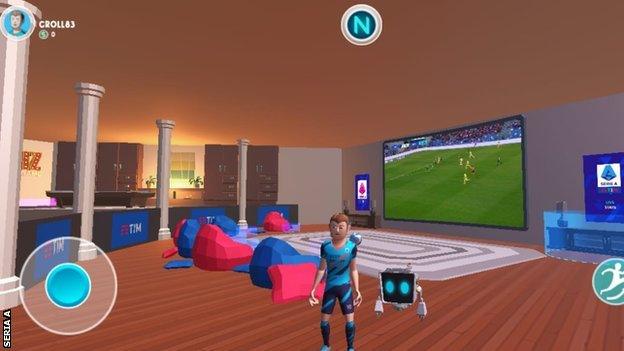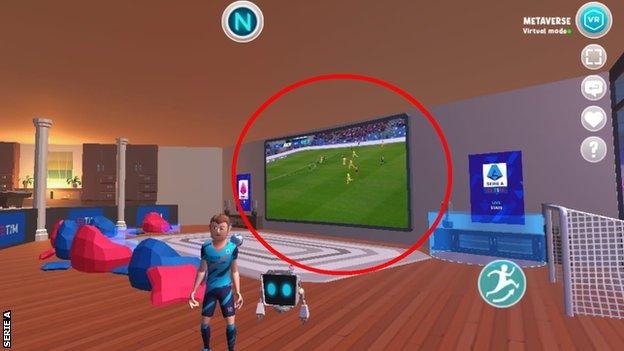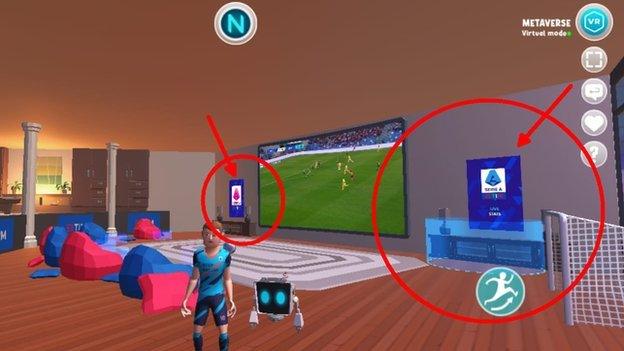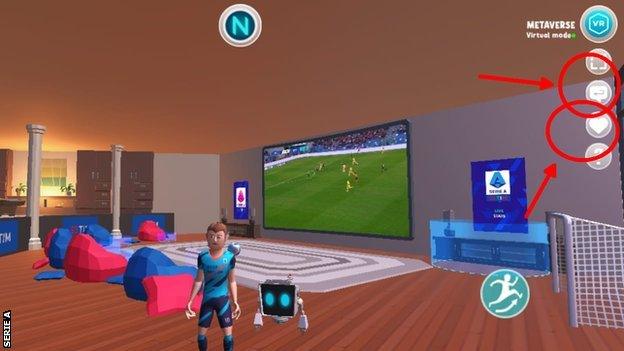Football in the metaverse: Is Serie A trial sign of things to come in sports broadcasting?
- Published

Serie A made 10,000 tokens available for free for fans to watch Milan-Fiorentina in the metaverse
AC Milan's pursuit of a first Serie A title in 11 years has provided plenty of drama and excitement for those in attendance at San Siro this season.
But what about for those watching in the metaverse?
On 1 May, football fans in the Middle East and North Africa (Mena) region had the opportunity to enjoy a world first when Milan's league game against Fiorentina was broadcast in this virtual world - an innovation yet to be attempted by any of Europe's other major leagues.
'Metaverse' has become a popular word in the virtual world - so what does it mean?
Mark Zuckerberg, the Facebook founder who rebranded his company as Meta last year, has called it "an embodied internet where you're in the experience, not just looking at it".
He added: "In the metaverse, you'll be able to do almost anything you can imagine - get together with friends and family, work, learn, play, shop, create. Think about how many physical things you have today that could just be holograms in the future. Your TV, your perfect work set-up with multiple monitors, your board games and more."
So why not watch a game in there?
That is the hope that those running Serie A have as they try to expand the league's appeal.
Serie A gave 10,000 fans in the Mena region the chance to access its virtual room on the metaverse, equipped with features such as a chat to interact with other users, a quiz to play and a TV screen to watch the game, via unique, free digital tokens.
Sayed Hassan Al Mousawi, 26, from Bahrain, was one of more than 7,000 fans who tuned in virtually for the Milan-Fiorentina game.
He entered the metaverse at home using a connected device (this can be a phone, tablet, laptop or PC) and moved himself (well, his avatar) around via touch screen.
In the virtual room he entered, there was a virtual TV screen and on that TV screen the game could be watched just like on a standard TV (see image below).

He could also take his pick of general or match-related statistics via these two areas of the virtual world...

Or chat with people and 'like' comments via these buttons...

"I could watch the game, run around and read stats with my avatar," says Al Mousawi. "I also put on the new Serie A anti-racism campaign kit.
"I am a software developer, so for me it was very easy to access the game. I downloaded an application, used the link provided on social media and entered the metaverse with my phone. The connection was stable, no delays at all. One thing is, I couldn't switch to full screen or zoom in, and that was annoying."
The Italian football league is reaching out to the so-called Generation Z, a young, supposedly inattentive audience who want to interact with their peers as they watch a game. The idea is that they can do all of that without leaving their digital world.
Serie A claims to have about 520 million fans in the world, but most are over 35 and with almost all the game's big names playing in England or Spain, a step in a different direction was perhaps inevitable.
After a pilot project to understand the potential of this new way of broadcasting the game, the goal now will be using it to generate revenue.
It could have a knock-on effect for broadcasters too. This trial in the Mena region was only possible because there is no official Serie A broadcaster there. It would not have been possible in Italy right now, where Sky and DAZN have the rights to show matches. When contracts come up for renewal, though, Serie A might carve up the rights to broadcast games on the metaverse and sell them to whoever wants to buy them.
This move is the league's latest step to try to modernise. It began two years ago with the launch of eSerie A - an official eSports competition. Serie A has also stepped into the controversial world of cryptocurrency - it signed the first sponsorship programme between a football league and a cryptocurrencies platform in May last year.
Serie A has developed its broadcasting infrastructure too, opening its new International Broadcasting Centre last October in Milan. At the centre, all Italian top-flight games are produced, edited, sent to broadcasters and commentated on in Italian, Arabic and English. Five virtual advertising feeds, displayed on localised LED boards in different countries around the world, are created for each game. People watching the game in the US see different commercials than those watching the same game in Italy.
Is this pioneering attitude paving the way for revolutionary broadcasting possibilities? Serie A seems to believe so. The future might be that you can wear virtual reality glasses and be transported to San Siro or any other stadium, taking the experience to another level entirely.
"We have chosen to be the first to broadcast a football match in the metaverse because we believe that the frontier of technological innovation is extremely important for a modern league such as Serie A," the organisation's chief executive Luigi de Siervo said.
Would Al Mousawi watch a game in the metaverse again?
"All in all it was a pleasant experience; but if I had to, I'd rather pay a fee to watch a game on a computer or a TV, because the small screen size was an issue. I am an Inter fan, so when the Nerazzurri play I am quite concentrated. I would have minor games running there, but not the big ones."
Opinions are still divided, which is typical for a transitional time.
It's hard to forecast how things are going to develop, as what we see in football is just a reflection of bigger social changes.
But it is worth remembering that not so long ago a pay-TV model was controversial and seemed unlikely to succeed. A few years ago, streaming games on the internet looked like a technological fantasy. Then second and third screens came, and now the metaverse. It's all possible.